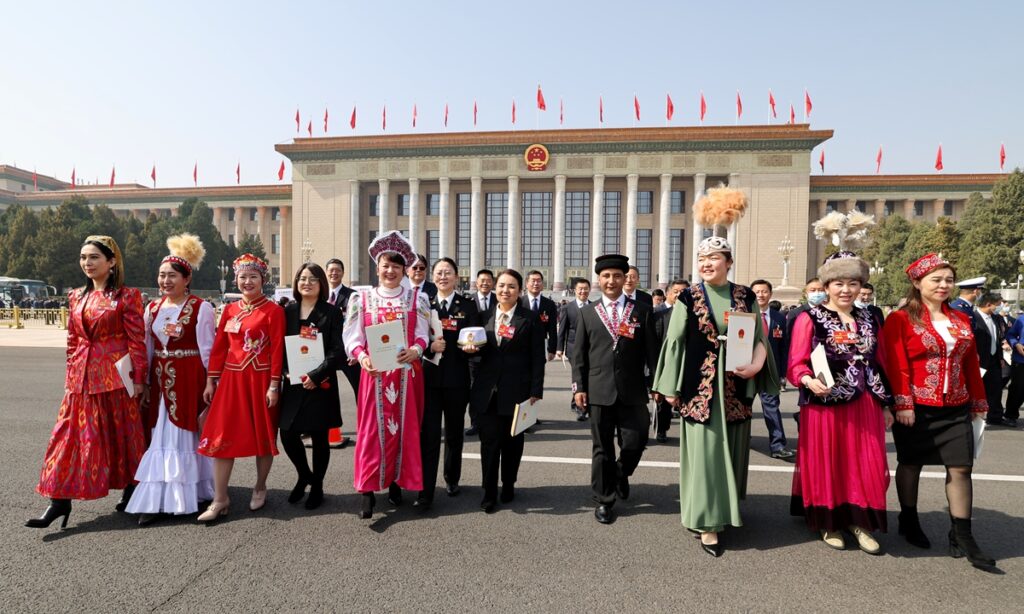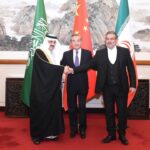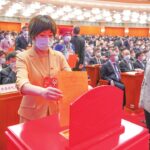Whole-process people’s democracy an alternative creative model: expert
Thousands of motions and proposals submitted by national legislators and political advisors successfully deliver public concerns to the central government. Experts said whole-process people’s democracy is a unique creation by China, which demonstrates Chinese system’s respect for its people with regard to governance, and offers the world an alternative when decaying Western democracy has shocked people’s belief in democracy as a whole.
The 14th National People’s Congress (NPC), China’s national legislature, held the fifth plenary meeting of its first session on Sunday morning in Beijing. During the session, the national legislature decided on the new lineup of the State Council, or the cabinet.
The 14th National Committee of the Chinese People’s Political Consultative Conference (CPPCC), the top political advisory body, concluded its first session on Saturday, calling for efforts to pool wisdom and strength to help accomplish the goals and tasks set at the 20th National Congress of the CPC, which was convened in October 2022.
As of Saturday, the NPC has received 271 motions from deputies, mostly about legislation, and amendments to current legislation; NPC deputies also made more than 8,000 suggestions to the top legislature, according to media reports.
Meanwhile, the top political advisory body received 5,399 proposals as of March 5, the Xinhua News Agency reported on Sunday. It reported that 42.4 percent of the suggestions focus on economic construction, while 28.5 percent and 13 percent are about social and ecological constructions respectively. Among them, 4,689 have been placed on file, Xinhua said.
This year, NPC deputies from several autonomous regions and provinces presented motions for the whole delegation, most of which aim to elevate regional development. The Global Times learned from the NPC delegation of the Inner Mongolia Autonomous Region that it has suggested to set up a free trade zone to take advantage of its location to build industrial and supply chains with neighboring Mongolia and Russia, and push regional economic development.
This year’s two sessions, convened after the 20th National Congress of the CPC and after China achieved decisive victory over COVID-19, has witnessed an “unprecedented” focus and emphasis on accelerating economic and social development, Zhang Yiwu, a professor of Chinese language and literature at Peking University, also a member of the CPPCC National Committee, told the Global Times.
Zhang said that apart from formulating concrete plans for growth, this year’s two sessions is set to inject much needed confidence for Chinese people and the world that China is making a strong comeback.
The joint press conferences for deputies and members at the two sessions always offer a peek into achievements and future plans of all walks of lives in China. In ministers’ joint press conferences on Sunday, head of the National Bureau of Statistics Kang Yi said he is confident that China will achieve its around 5 percent GDP growth target this year. Chinese Minister of Ecology and Environment Huang Runqiu said China is the country that enjoyed fastest improvement in its air quality.
Feng Dan, an NPC deputy and a computer science professor at Huazhong University of Science and Technology told the press on Sunday that she and her team are working on a data storage that is faster and with lower energy consumption to make breakthroughs in the “stranglehold” in China’s chip industry.
Creative model of democracy
A deputy from the NPC delegation of Inner Mongolia told the Global Times that every year, electoral units work hard to ensure that deputies come from all walks of life and represent all social groups, so they can convey public concerns to the central government.
As the top legislature, the 14th NPC brought together 2,977 deputies from an array of professions and backgrounds. Among them, 442 are from ethnic minority groups, accounting for 14.85 percent of the total and covering every one of China’s 55 ethnic minority groups, the latest official figures showed.
This year’s motions and suggestions from NPC deputies and CPPCC members cover a wide range of topics of public concern, including those on improving the education and healthcare systems, boosting the birth rate, granting workers more holidays and how to make the environment greener.
Yi Tong, a deputy to the 14th NPC who works at the Beijing Academy of Science and Technology, has served as an NPC deputy for five years. She told the Global Times that every time she submits a motion, she carries out several field trips and talks to the public about their concerns. “The motions are not an epiphany. They are like social research work that came about after thorough investigations.”
For example, in 2018, Yi spent months talking to young mothers and drafted a motion encouraging communities to establish nurseries for children aged under 3 years old.
Two sessions represent full embodiment of China’s whole-process people’s democracy, as it demonstrates China’s innovation of democracy to draw opinions from public, delivers then to the top; and shows Chinese system’s respect to its people in regard of governance, Zhang Shuhua, director of the institute of political sciences at the Chinese Academy of Social Sciences, told the Global Times.
Zhang Shuhua said China’s whole-process people’s democracy is also China’s answer and creative model for the world, when chaos, and failing of Western governance have caused wide confusion over the term “democracy.”
The decay of US “democracy” is highlighted by the capitol riots in 2021, increasing gun violence, intensified racial problems, and more importantly, politicians would rather use those issues to achieve their own political purposes, rather than addressing those woes. Ironically, democracy has been used more frequently as a weapon for the US government to attack countries in the international arena.
China’s pushing for high-quality and correct development of its own democracy model will not only overcome the drawbacks of Western democracy, it is also set to provide the world an alternative to the decaying Western democracy and a new form of political civilization, Zhang Shuhua said.




